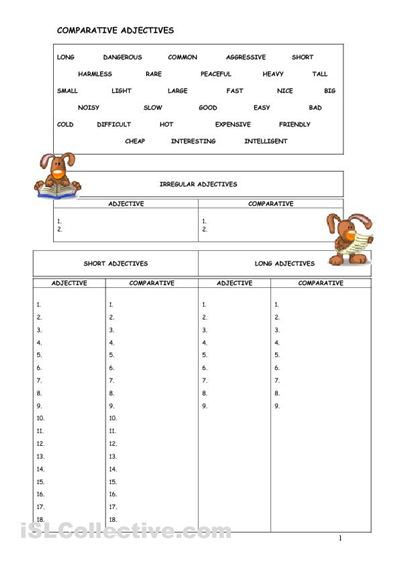Complete the exercise below. If you need guidance, refer to Verbs: Irregular Verbs [Part 2] post.
"English Chamber" provides you grammar lessons, exercises, and perhaps get your tongue twisted with words. Hope that you should be able gain some degree of proficiency in the language. Learning is fun, so enjoy your visiting!
Thursday, 5 January 2012
Verbs - Regular Verbs [Part 1]
VERBS:
Verbs are words which are used to show the performance of an action, thoughts, feelings, possessions, or a state of being (be).
- REGULAR VERBS:
The past tense form of a regular verb ends either in '-d' or '-ed'.
Wednesday, 4 January 2012
Exercise 5 - Comparison of Adjectives [Part 2]
We have done both parts of Comparison of Adjectives [Part 1] and Comparison of Adjectives [Part 2]. The lessons are not complete without exercise. Enjoy yourself!
Comparison of Adjectives [Part 2] - Irregular Comparison
The Comparison of Comparative and Superlative of adjectives are formed in two other ways:
Comparative:
'More' is added.
Superlative:
'Most' is added.
Irregular Comparison:
The words 'less' and 'least' are used.
Example of Comparison of Adjectives:
Tuesday, 3 January 2012
Exercise 4 - Comparison of Adjectives [Part 1]
We had done with our Comparison of Adjectives' [Part 1] lesson. Now, test yourself by completing the exercise below:
Comparison of Adjectives [Part 1]
The girls in the picture are making comparisons among themselves.
Positive Degree:
Mei Hua's hair is long.
- To compare TWO equal things or persons.
Comparative Degree:
Hema's hair is longer.
- She adds '-er'.
- To compare TWO unequal things or persons.
Superlative Degree:
Diana's hair is the longest.
- She has added '-est'.
- To compare THREE or MORE things or persons.
Monday, 2 January 2012
Exercise 3 - Adjectives
Have you read the previous post on Adjectives? Hope you enjoy learning Adjectives. Below is the exercise of Adjectives.
Adjectives
Look at the picture above.
What do you see in the picture?
You can see two men.
What is the difference between them?
A big man and a small man.
The words big and small tell us something about the Nouns.
Such words are called Adjectives.
Words which tell us something about nouns are called Adjectives.
You can the video of adjectives below to help you understand better. Happy watching and learning!!
Sunday, 1 January 2012
Exercise 2 - Countable and Uncountable Nouns
Now, do you know the nouns that can be counted and nouns that cannot be counted? I hope that the lesson on "Countable and Uncountable Nouns" helps you in identifying the number of nouns. To test your understanding, let's complete the exercise below:
Instruction: Look at the pictures on the right box. Then, find the words of countable or uncountable nouns.
GOOD LUCK!!
Have you done Exercise 1? Here is Exercise 1 answers:
- Peter Piper
- Pickled Peppers
Countable and Uncountable Nouns
Look at the picture above.
Can you name the nouns which can be counted?
We can count fruits, vegetables and fishes.
They are called countable nouns.
Which are the nouns that cannot be counted?
We cannot count water and ice cream.
They are called uncountable nouns.
Countable nouns are nouns which can be counted.
Uncountable nouns are nouns which cannot be counted.
Name the words which go with COUNTABLE NOUNS:
a, an, a few, many, several, some, any, plenty of, a lot of and a large number of.
a little and much don't go with countable nouns.
Which are the words that go with UNCOUNTABLE NOUNS?
a little, much, some, any, plenty of, a lot of, a large amount of and a great deal of.
Do you know the words which don't go with uncountable nouns?
They are a , an, a few and many.Do you want to know more about countable and uncountable nouns? Here is a video for you to watch and learn more about countable and uncountable nouns. Enjoy!!
Subscribe to:
Comments (Atom)















